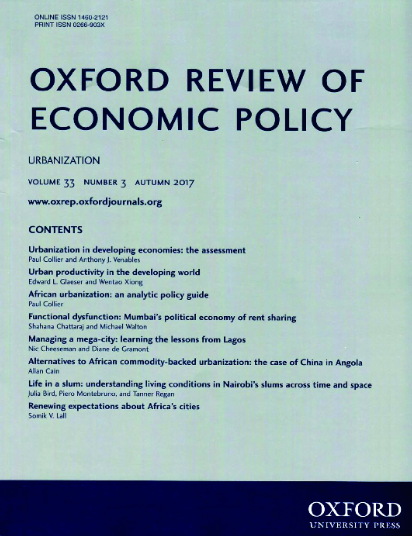“资本主义:出了什么问题?”谁出了问题?资本主义市场经济?政府?“新自由主义”经济学?
IF 1.8
2区 经济学
Q2 ECONOMICS
引用次数: 1
摘要
这篇论文为《牛津经济政策评论》关于“资本主义:出了什么问题,需要改变什么,以及如何修复?”的研讨会做出了贡献。分析的出发点是,在美国、英国和欧洲大陆,普遍的不满情绪已成为一股重要的政治力量。我将这种不满归因于过去几十年发展中的不公平感。我将这种不公平感与以下因素联系起来:(I)结构性变革的负面影响,包括失业和地区衰退;(ii)高管薪酬和金融部门薪酬的异常增长,加上政府在全球金融危机中的救助,随着公共服务和公共投资的缩减,除了救助和对“效率”的关注,其意义是由企业高管的观念而非标准的福利经济学驱动的。为了捕捉这些发展,人们需要从法国“资本主义”或德国“Kapitalismus”的意义上思考“资本主义”,关注财富和权力的共生,包括消除竞争,而不是英国意义上的市场经济的另一个术语。本文章由计算机程序翻译,如有差异,请以英文原文为准。
"Capitalism: What Has Gone Wrong?" Who Went Wrong? Capitalism? The Market Economy? Governments? "Neoliberal" Economics?
The paper contributes to a symposium of the Oxford Review of Economic Policy on “Capitalism: What has Gone Wrong, What Needs to Change, and How can it be Fixed?”. The analysis starts from the observation that, in the United States, the United Kingdom and continental Europe, widespread discontent has become an important political force. I attribute this discontent to a sense on unfairness in developments of the past few decades. I relate this sense of unfairness to: (i) negative effects of structural change, including joblessness and regional decline, (ii) the observation of extraordinary growth in executive remuneration and financial-sector remuneration, coupled with government bailouts in the global financial crisis, and (iii) changes in public policy and public discourse, with a retrenchment of public services and public investment, except for bailouts and a focus on “efficiency”, the meaning of which is driven by the perceptions of corporate executives rather than standard welfare economics. To capture these developments, one needs to think about “capitalism” in the sense of French “capitalism” or German “Kapitalismus”, with a focus on the symbiosis of wealth and power, including the elimination of competition, rather than the English sense of merely another term for the market economy.
求助全文
通过发布文献求助,成功后即可免费获取论文全文。
去求助
来源期刊

Oxford Review of Economic Policy
ECONOMICS-
CiteScore
12.50
自引率
1.50%
发文量
41
期刊介绍:
The Oxford Review of Economic Policy is a refereed journal which is published quarterly. Each issue concentrates on a current theme in economic policy, with a balance between macro- and microeconomics, and comprises an assessment and a number of articles. It gives a valuable appraisal of economic policies worldwide. While the analysis is challenging and at the forefront of current thinking, articles are presented in non-technical language to make them readily accessible to all readers. The Oxford Review is aimed at a wide audience including government, business and policy-makers, as well as academics and students. It is required reading for those who need to know where research is leading.
 求助内容:
求助内容: 应助结果提醒方式:
应助结果提醒方式:


